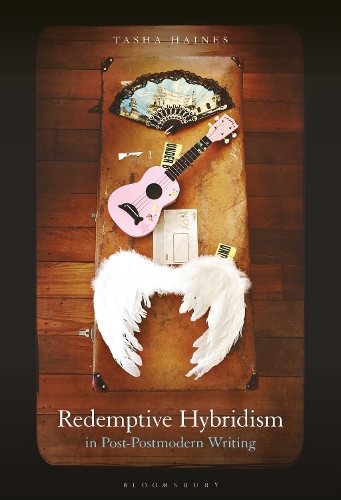
Redemptive Hybridism in Post-Postmodern Writing
(Paperback)
Available Formats
Publishing Details
Redemptive Hybridism in Post-Postmodern Writing
By (Author) Dr. Tasha Haines
Bloomsbury Publishing PLC
Bloomsbury Academic USA
26th June 2025
United States
Classifications
Professional and Scholarly
Non Fiction
Comparative literature
Literary studies: fiction, novelists and prose writers
Literary studies: c 1900 to c 2000
Literary studies: from c 2000
809.9113
Physical Properties
Paperback
168
Width 152mm, Height 230mm, Spine 20mm
260g
Description
From Virginia Woolf to David Foster Wallace and beyond, 'redemptive hybridism' a new way of reading texts full of possibility and genre blending emerges as a key trajectory for post-postmodernity. Tasha Haines investigates what she calls 'redemptive hybridism' a tendency in post-postmodern writing characterized by possibility. She suggests that near the 21st century, postmodern litisme gives way to a reparative blending of high-low forms and genre collaborations for challenging and extending the relationship between writer, written material, and reader. By combining an innovative literary investigation with creative and auto-theoretical strategies, Haines offers valuable new interpretations for texts of the modernisms continuum. Her conversational survey moves among the hybridity of Virginia Woolf, the paratextuality of David Foster Wallace, with Nathalie Sarraute, douard Lev, Maggie Nelson and more. In reference to Deleuze and Guattari, Hassan, and others, writers are curated for their approach to form, method, and content, evoking and invoking textual hybridity. Haines articulates a new way of viewing works via comparisons and close-ups that exemplify the possibility and genre-blending that is Redemptive Hybridism in Post-Postmodern Writing.
Reviews
With humility, skill, and ingenuity, Tasha Haines co-mingles philosophy, theory, and artistic autobiography to approach some of the most complex texts in the modernisms continuum. In Redemptive Hybridism, the hybrid, creative theories of Deleuze and Guattari, Hassan, Lyotard, Eagleton, Bakhtin, and others, flow through Virginia Woolfs atomic saturation, David Foster Wallaces unfinishedness, and Maggie Nelsons fragments. Haines marriage of form and content is unusually lucid. It is a rare delight to accept Haines invitation to engage spaces of possibility in recognition of the fact that nothing ever really dies it simply crosses over, hybridly, redemptively. * Marcela Sulak, Professor of English Literature and Linguistics, Bar-Ilan University, Israel *
A playful, probing text that not only forges new pathways for considering two major figures of the 20th century, but also provocatively invites the reader to reflect on their own role in the process. Reversing and disrupting received wisdom, Haines assembles a ludic and agile critical apparatus that is both critically rigorous and enormously enjoyable to read. * Clare Hayes-Brady, Associate Professor of American Literature, University College Dublin, Ireland *
'To be post is to hold onto the past while transforming it, Tasha Haines writes in her introduction. Firmly situating this study in the 21st century, hybridization emerges as a recuperative, exploratory act. Only with the un-mooring that comes with such risk, Haines argues, is real discoverya re-envisioning of the terrain artists and theorists have covered and recoveredpossible. * Jacqueline Kolosov, Professor of Creative Writing, Texas Tech University, USA *
A discursively daring exploration of the conditions of redemption, sincerity, and literary camaraderie as located both in texts and at the seat of reader engagement. * Linda Ceriello, Part-Time Assistant Professor of Religious Studies, Kennesaw State University, USA *
Author Bio
Tasha Haines is a writer and maker of hybrid forms, based in New Zealand. She has a background in mixed-media arts practice and teaching, with a PhD in literary theory and creative writing.
